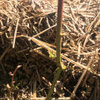Hi All,
I've stumbled upon something interesting and hopefully Ann will chime in.....I have RRD in a customers garden and could not for the life of me find any multiflora infected in a wooded area adjacent to the house. Tons of multiflora but no disease. When I discovered the RRD on some minis on the opposite side of the house I logically said to myself the in between point is the side yard with a 10' wide space of wild growth between the homes. Sure enough I found the RRD, but not on multiflora.....on wild blackberry. Now blackberry is in the same family as roses so I'm wondering if in fact blackberry is the host or co-host. Here it most definitely is the host since the multiflora is fine. See some pics.
Wild Blackberry Dead with one cane severly infected
{{gwi:282002}}
RRD on Blackberry
{{gwi:282003}}
More RRD on blackberry
{{gwi:282004}}
RRD on Mini (notice same plant in fore of pic)
{{gwi:282005}}
RRD on Warm Wishes
{{gwi:282007}}
Pope John Paul II
{{gwi:282009}}
Peace
{{gwi:282011}}
I'm pretty confident I can control this problem now that I know blackberry is the host in this yard. Just thought you all should know.
Michael






anntn6b
kidhorn
Related Discussions
Knockout roses twisted leaves & small blooms
Q
Update on possible RRD
Q
Could people who are familiar with rrd please have a look at these pho
Q
RRD prevention ?
Q
rosesnpots
anntn6b
newjersey_roseOriginal Author
rosesnpots
jerijen
anntn6b
rosesnpots
jbcarr
patricianat
newjersey_roseOriginal Author
patricianat
michelle_co
newjersey_roseOriginal Author
berndoodle
jody
ehann
sammy zone 7 Tulsa
kathy9norcal
michelle_co
jbcarr
Zyperiris
patricianat
rosesnpots
jim_east_coast_zn7
newjersey_roseOriginal Author
patricianat
newjersey_roseOriginal Author
ramblinrosez7b
newjersey_roseOriginal Author
DianaT
carla17
jerijen
DianaT
odyssey3
anntn6b
gnomey
odyssey3
kandaceshirley
cactusjoe1